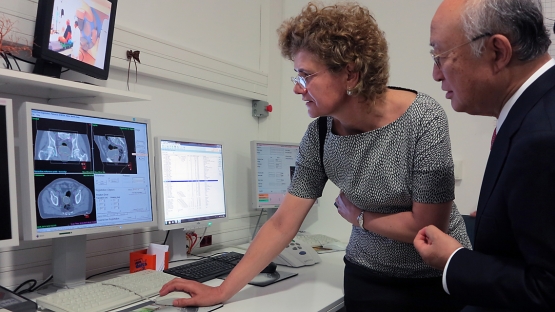Strengthening health systems for cancer diagnosis and treatment using nuclear technology, controlling fruit flies in the Balkans and the Eastern Mediterranean, and establishing a nuclear waste storage centre were among the key issues that IAEA Director General Yukiya Amano discussed with senior officials during a two-day visit to Croatia on 18 and 19 May 2015. Mr Amano also briefed President Kolinda Grabar-Kitarović on the work of the IAEA and its relevance to the wider global development agenda.
Mr Amano visited the University Hospital Centre, Sisters of Charity, in Zagreb, one of the country’s leading cancer treatment centres, where he was briefed on the treatment provided to cancer patients using radiation medicine. Senior medical staff also informed Mr Amano about efforts to further strengthen the country’s cancer programme, including early detection, diagnosis and treatment. Fighting cancer is a key health policy objective in Croatia, with over a quarter of its population affected by the disease. The hospital’s management requested the IAEA’s support in upgrading their radiotherapy machines and in providing additional training for medical staff in radiation therapy and treatment.
Minister of Economy Ivan Vrdoljak and Mr Amano discussed Croatia's plan to establish a storage facility for radioactive waste, disused radioactive sources and spent nuclear fuel in the next five to eight years. Last October Croatia’s Parliament adopted the country’s Strategy for the Management of Radioactive Waste, Disused Sources and Spent Nuclear Fuel, which includes plans to develop a storage centre for nuclear and radioactive waste, maintaining the highest safety and security standards. The Croatian share of the nuclear waste from the Krško nuclear power plant in Slovenia, which is jointly operated by the two countries, as well as other radioactive waste produced from medical applications and research facilities will be stored at this facility. Minister Vrdoljak requested the IAEA’s support with the establishment of the centre, including training of staff.
Discussions with Minister of Agriculture Tihomir Jakovinaalso touched on various applications of nuclear technology, particularly further collaboration in controlling fruit flies in the Balkan and Eastern Mediterranean using the sterile insect technique (SIT). This method uses ionizing radiation to sterilize male flies that are mass-produced in special rearing facilities. These male flies are then released systematically in infested areas, where they mate with wild females, but do not produce offspring. Croatia has used the technique to save the country’s tangerine plantations while minimizing the use of pesticides. The Croatian Centre for Agriculture, Food and Rural Affairs in Opuzen, Croatia, has the capacity to produce over 20 million sterile males for release each week in Croatia and neighbouring Bosnia Herzegovina. The Neretva river valley, where the flies are released, accounts for 80 per cent of Croatia’s tangerine production.
The IAEA provides support to Croatia, under its technical cooperation programme, in four areas: radiation medicine and health, nuclear energy development and radioactive waste management, nuclear and radiation safety and security, and the application of isotopes and radiation techniques in environment, industry and education. As part of this support, the IAEA helped with the upgrade of the country’s Co-60 panoramic irradiation facility, which provides research, development and contract services in various aspects of irradiation technologies in the Radiation Chemistry and Dosimetry Laboratory of the Ruđer Bošković Institute in Zagreb. The Croatian Government shared the costs of the upgrade.
Croatia is also participating in 25 regional and interregional IAEA projects, focusing on waste management, radiation safety, research reactor applications, nuclear medicine, nuclear applications, and harmonization and strengthening of regional preparedness and response in nuclear emergencies.
During his visit, Mr Amano also met with Minister of Health Siniša Varga, Deputy Minister of Science, Education and Sport Roko Andričević, Deputy Minister of Foreign and European Affairs Joško Klisović and Assistant Minister of Health Dragan Korolija Marinić.


